The SSD Relapse: Understanding and Choosing the Best SSD
by Anand Lal Shimpi on August 30, 2009 12:00 AM EST- Posted in
- Storage
Why SSDs Care About What You Write: Fragmentation & Write Combining
PC Perspective's Allyn Malventano is a smart dude, just read one of his articles to figure that out. He pieced together a big aspect of how the X25-M worked on his own, a major key to how to improve SSD performance.
You'll remember from the Anthology that SSDs get their high performance by being able to write to multiple flash die across multiple channels in parallel. This works very well for very large files since you can easily split the reads and writes across multiple die/channels.
Here we go to write a 128KB file, it's split up and written across multiple channels in our tiny mock SSD:
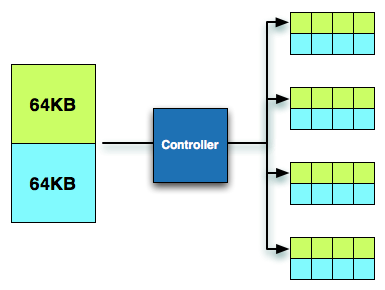
When we go to read the file, it's read across multiple channels and performance is once again, excellent.
Remember what we talked about before however: small file random read/write performance is actually what ends up being slowest on hard drives. It's what often happens on a PC and thus we run into a problem when performing such an IO. Here we go to write a 4KB file. The smallest size we can write is 4KB and thus it's not split up at all, it can only be written to a single channel:
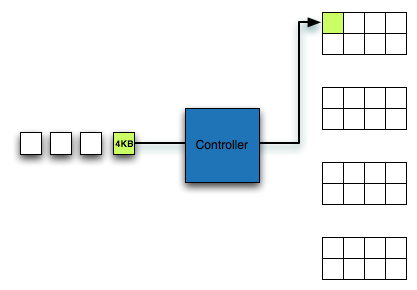
As Alyn discovered, Intel and other manufacturers get around this issue by combining small writes into larger groups. Random writes rarely happen in a separated manner, they come in bursts with many at a time. A write combining controller will take a group of 4KB writes, arrange them in parallel, and then write them together at the same time.
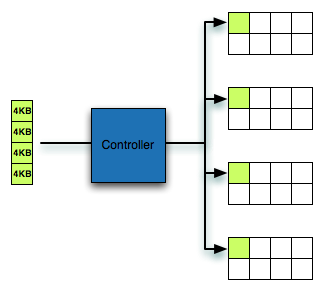
This does wonders for improving random small file write performance, as everything completes as fast as a larger sequential write would. What it hurts is what happens when you overwrite data.
In the first example where we wrote a 128KB file, look what happens if we delete the file:
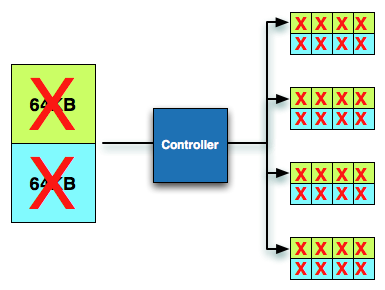
Entire blocks are invalidated. Every single LBA in these blocks will come back invalid and can quickly be cleaned.
Look at what happens in the second example. These 4KB fragments are unrelated, so when one is overwritten, the rest aren't. A few deletes and now we're left with this sort of a situation:
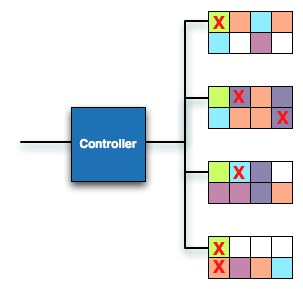
Ugh. These fragmented blocks are a pain to deal with. Try to write to it now and you have to do a read-modify-write. Without TRIM support, nearly every write to these blocks will require a read-modify-write and send write amplification through the roof. This is the downside of write combining.
Intel's controller does its best to recover from these situations. That's why its used random write performance is still very good. Samsung's controller isn't very good at recovering from these situations.
Now you can see why performing a sequential write over the span of the drive fixes a fragmented drive. It turns the overly fragmented case into one that's easy to deal with, hooray. You can also see why SSD degradation happens over time. You don't spend all day writing large sequential files to your disk. Instead you write a combination of random and sequential, large and small files to the disk.










295 Comments
View All Comments
Abjuk - Wednesday, September 2, 2009 - link
Agreed CM, my current project at work takes about six minutes to build from scratch and CPU usage never gets above about 35%. The process is totally IO bound.It really depends on whether you have several large source files or several hundred small ones.
Weyzer - Tuesday, September 1, 2009 - link
Good article and testing, but why was the Crucial M225 not mentioned at all? It's performance is similar to the vertex drives, I know, but I think it could have been mentioned somewhere, if it is in the good or bad range.jasperjones - Tuesday, September 1, 2009 - link
javascript:link('frmText') $997 @ Newegg omgomgomgNeedless to say, that price will come down quickly. So more seriously, after reading the article I really feel I understand better what to look for in an SSD. Thanks!
paesan - Tuesday, September 1, 2009 - link
Wow, does NE really think that anyone will buy the Intel drive at that price. OMG!!! Funny thing, it is in stock and it says limit 1 per customer. LolCList - Tuesday, September 1, 2009 - link
Obviously someone is buying them at that price or they'd lower it. The people who can't wait two or three weeks and are willing to be gouged for these drives are the ones that allow NewEgg to give us low margins on other products while not going out of business :Dravaneli - Tuesday, September 1, 2009 - link
I just decided to buy one and when I opened newegg i couldn't believe my eyes. I hope that is only because they have a few drives left, and once Intel pumps up some stock in the retailers the prices will go back to Intel's retail.Does anyone know what are the production capabilities of Intel's SSD factories? I don't want to wait a whole year until the market saturates.
LazierSaid - Tuesday, September 1, 2009 - link
This article was so good that Newegg doubled their X25M G2 prices overnight.medi01 - Tuesday, September 1, 2009 - link
Yep, very impressive advertisement indeed.HVAC - Tuesday, September 1, 2009 - link
I'd rather have ewoks in the sequels than Jar-jar ...Naccah - Tuesday, September 1, 2009 - link
Newegg's prices on all the Intel SSDs skyrocketed. The X-25 G2s are $499 now. Is this price a reflection of the high demand or did Intel change the price again?